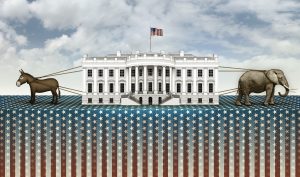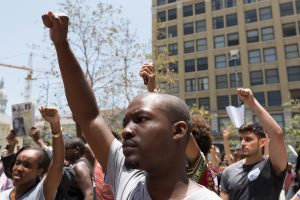A commentary
We are in the middle of the most consequential presidential election in modern American history. Conventional political wisdom informs us that this election, more than any other, will define this country for generations to come; leading many political talking heads to describe America as being at an inflection point. I believe we are at that place.

Late last week, I traveled to Hilton Head Island, South Carolina. I sought to fulfill a lifelong goal: to visit the Gullah community on the islands off the coast.
The Gullah community represents a unique story. The Gullah are proud people, who, with the benefit of geography, developed a creole language similar to Sierra Leone Krio and a culture rich in the traditions of Africa. On a beautiful late summer day, we ferried to Daufuskie Island for the day. Our journey took us to the First Union African Baptist Church, established in 1881. We also visited the Mary Field School, which was built by the workers on the Island to educate the children of African American families after emancipation. Touring Daufuskie Island – and in this divisive period in our history – reminded me of the past, and how far America has traveled.
On our return to Hilton Head Island, though, the past collided with the present and perhaps the future. After taking our seat on the ferry, we sought to enjoy the beauty of the waterway connecting the Island to the mainland. But a local couple caught our attention: Seated a distance from us but, in clear view, was a man and his wife covered in tattoos. Extensive tattoos, some of which included Nazi swastikas, and what looked like SS lightning runes. It was mind-boggling in its boldness.
Observing a neo-Nazi sympathizer returning from what amounted to an isolated former South Carolina penal colony for slaves, offered for me a stark reminder of our times; and of the inflection point in our enduring democracy.
A neo-Nazi sympathizer returning from Daufuskie Island offered me a stark reminder of our times and the inflection point in our democracy.
The United States is in the midst of a culture war. The 2020 election represents a meeting point of two distinct perspectives on the future of this country. On the left, the vision for America is inclusive, tolerant, and equitable, a liberal nationalism that is open to all at its best. On the right, the vision for this country lies in the belief that America has lost its way and restoration of America’s greatness depends upon a romanticized image of our past. At its core, the battle for the heart and soul of the country will be determined by how many voters side with the couple on the ferry. We know how they will vote.
I have lived in the United States for thirty years, an immigrant from the UK, with my family’s heritage in Jamaica. America is a country like no other, and one that I now proudly call home. It is a nation of contradictions rooted within two competing political beliefs. On the one hand, we are a nation that will comfortably seek to deny our low-income citizens the most basic forms of a social safety net – yet come together like no other during periods of natural disasters. We are a nation whose non-profit community is supported by a $450 billion philanthropic community, yet willingly mortgages our future on tax cuts for the rich that imperil our future ability to fund social security and government-funded health care. At its best, America is inclusive, progressive, open, and pluralist. But I am under no illusions about what it has had to transcend to get there. For Black Americans, this has been a dangerous, unfree, and unsafe place.

Last week the Democratic Party offered the nation their vision for America’s future. On domestic issues, the Democratic Party will strive to heal the divisions of a beleaguered nation ripped apart by social inequities, police injustice, and the most sustained attack on the media since the inception of the Republic. The Democrats offered the country a vision of modern-day America as a mosaic of diverse interests, groups, and communities, each connected to the whole by a set of shared values. The faces and the communities from which our modern-day nation has evolved and, more critically, will inform our future, were on full display during the Democratic Party Convention. This is not the party for the tattooed man with the swastika on his arm.
This week the Republican Party will offer a contrasting vision of the United States in the twenty-first century. For the Trump Republican Party – a term I use deliberately – America is a country under siege. The international system has wronged it, and globalist forces have subjugated its white population. We will likely observe repeated attacks on global institutions, foreigners, and minorities.
The Trump Republican Party will present itself as the last vanguard against lawlessness and a strong supporter of law and order. The party will demonize Black Lives Matter as an anarchist movement hell-bent on raining mass destruction on communities across the nation. We can anticipate crass efforts to generate black votes with references to President Lincoln and the Administration’s support for the African American community through criminal justice reform and job creation. We can also anticipate further attacks on illegal immigrants for denying the American worker access to employment and, worse of all, for the lawlessness of criminals among them who have brought terror into the country.
Extremists whipped up the worst sentiments of a few to exploit fear, resentment, and insecurity.
I have been here before. I remember Britain in the 1970s and 80s when the decay of global power and the decline of the British economy propelled racial tensions. With my friends in South London, I protested against the rise of the right: the National Front and the BNP and their odious allies who displayed the same swastikas and attitudes. Extremists whipped up the worst sentiments of a few to exploit fear, resentment, and insecurity.

I do not believe America will take the same path as the UK. I do not believe there were “very fine people on both sides” of the far-right protests at Charlottesville, as President Trump has said. And I do not believe that most Americans do either. But there is no doubt that racial extremists have been given license to show their allegiances by what has happened over the last three years. That has to change.
America will get through this period in our history. It always does. Demographic shifts inform us that this will become a minority-majority country within the next 30 yrs. The transition of Black Lives Matter (BLM) from a fringe protest group into a mainstream civil rights organization leading a multi-racial movement for social justice has been remarkable. I am hopeful for America’s future because we have a system of government, while under attack from the Trump Administration, is enduring. I am optimistic because of our young people. The generation of activists and protesters who march under the banner of BLM are among the most remarkable, resilient young people this country has ever produced. They are determined, and they will not give up until their demands for a better and just America are realized. This generation will heal the wounds of the present and lead us into the future.
This generation will heal the wounds of the present and lead us into the future.
Britain, too, will heal from the wounds created by Brexit. The nation will adjust to the realities of a new world; new alliances will be forged and new partnerships established. Britain’s relationship with her European cousins has never been an easy one, but with the benefit of time, this too shall heal following a period of quiet re-alignment. Extremism will rear its ugly head from time-to-time. It always does. However, history also informs us that reason invariably prevails within the British political system.
The changing demographics of the United Kingdom will also result in the gradual emergence of a different kind of nation. Britain will become a better and more tolerant version of itself. The nation will journey into the future on the backs of the fastest-growing demographic group in the United Kingdom – the mixed-race community. The future will increasingly look less like the winning team from the 1966 World Cup and more like the modern-day national football team from the Russia 2018 World Cup.


